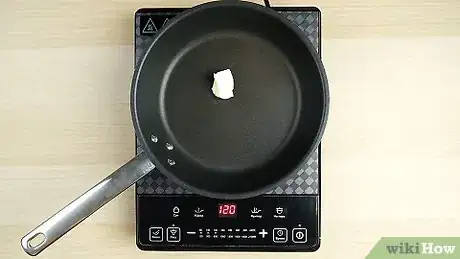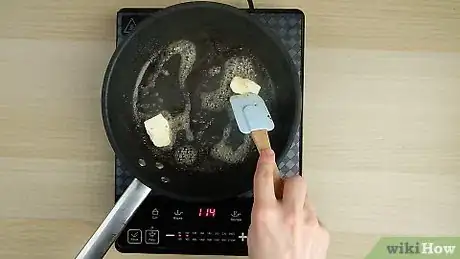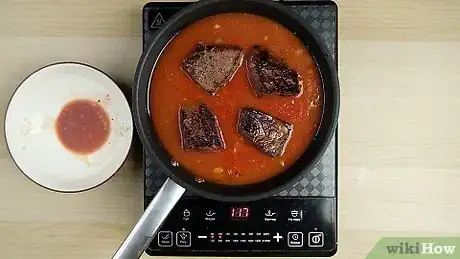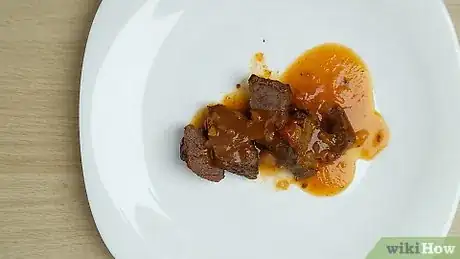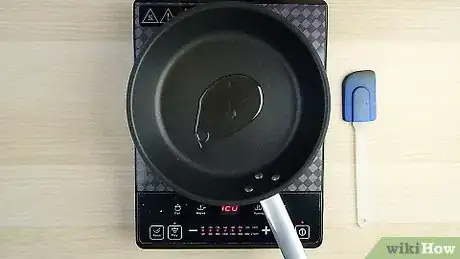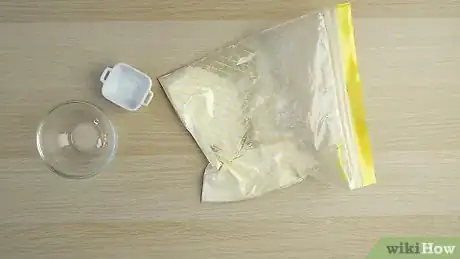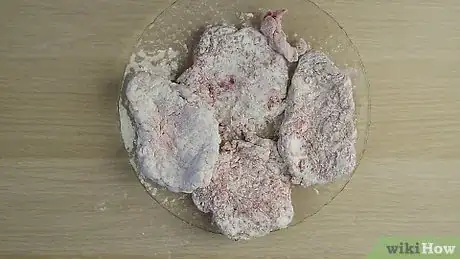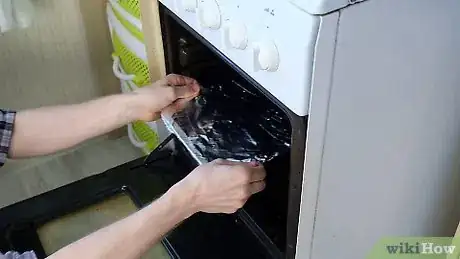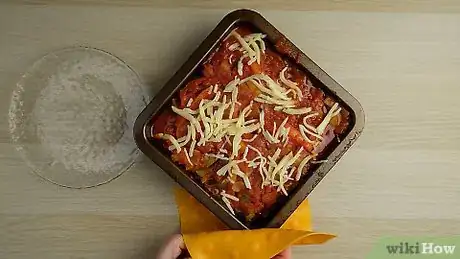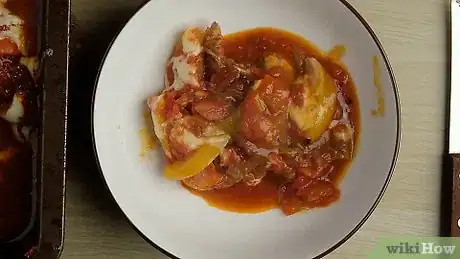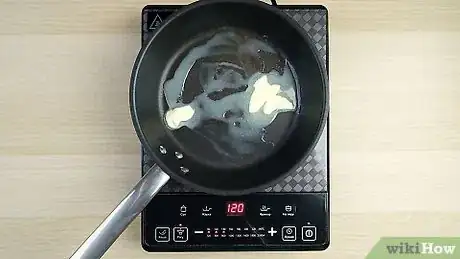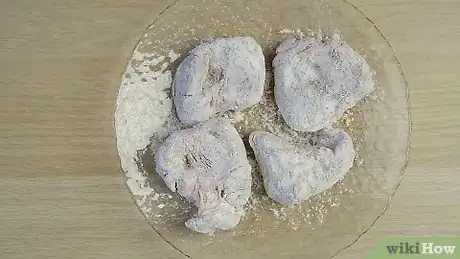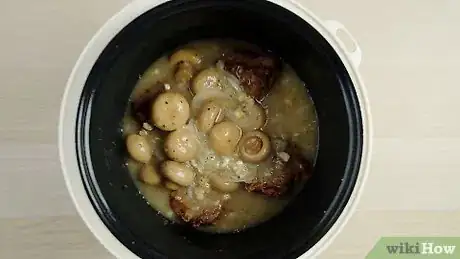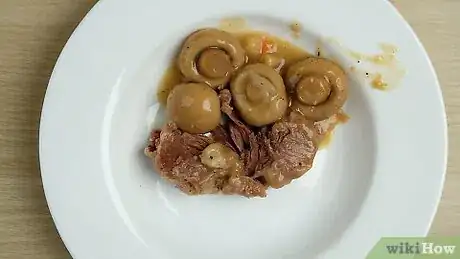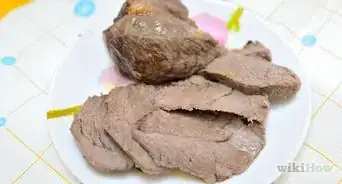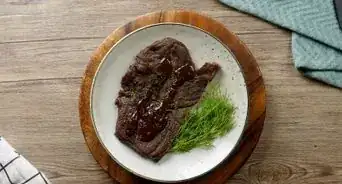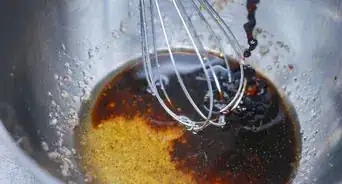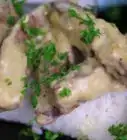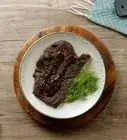This article was co-authored by wikiHow Staff. Our trained team of editors and researchers validate articles for accuracy and comprehensiveness. wikiHow's Content Management Team carefully monitors the work from our editorial staff to ensure that each article is backed by trusted research and meets our high quality standards.
The wikiHow Video Team also followed the article's instructions and verified that they work.
This article has been viewed 679,975 times.
Learn more...
Round steak tends to be a fairly inexpensive cut of beef, but unfortunately, it can become tough and chewy if not cooked the right way. Cooking methods that allow the round steak to cook slowly while sitting in liquid are generally best, such as the ones that follow.
Ingredients
Makes 4 servings
- 3 Tbsp (45 ml) butter, divided
- 1 lb (450 g) round steak, cut into 4 equal pieces
- 1/2 tsp (2.5 ml) salt
- 1/2 tsp (2.5 ml) ground black pepper
- 1 small onion, diced
- 1 clove garlic, minced
- 1 cup (250 ml) tomato sauce
- 1/4 cup (60 ml) maple syrup
- 2 Tbsp (30 ml) soy sauce
- 1/2 tsp (2.5 ml) red pepper flakes (optional)
- 1 Tbsp (15 ml) apple cider vinegar
- 1 cup (250 ml) beef broth or beef stock
Makes 4 servings
- 1 lb (450 g) top round steak, cut into 4 pieces
- 4 Tbsp (60 ml) all-purpose flour
- 1 tsp (5 ml) salt
- 2 Tbsp (30 ml) canola oil or olive oil
- 1 sliced medium onion
- 2 chopped garlic cloves
- 1/2 cup (125 ml) chopped celery
- 2 Tbsp (30 ml) chopped onion
- 1/2 each of red, yellow and green bell peppers cut in strips
- 2 cans stewed tomatoes, undrained, 14.5 oz (415 g) each
- 1/2 tsp (2.5 ml) Worcestershire sauce
- 1/4 cup (60 ml) shredded cheddar cheese
Makes 4 servings
- 1 lb (450 ml) round steak, cut into 4 pieces
- 2 Tbsp (30 ml) butter or margarine
- 1/4 cup (60 ml) all-purpose flour
- 1/2 tsp (2.5 ml) garlic powder
- 1/4 tsp (1.25 ml) salt
- 1/2 tsp (2.5 ml) ground black pepper
- 1 medium onion, sliced
- 1/2 package dry onion soup mix
- 8 oz (250 ml) beef broth
- 7 oz (215 ml) can mushrooms, undrained
- 1/2 tsp (2.5 ml) brown sugar
- 1/8 tsp (0.625 ml) ground allspice
- 1/4 tsp (1.25 ml) ground ginger
- 1 bay leaf
Steps
Making Braised Round Steak
-
1Melt 1 Tbsp (15 ml) butter in a large skillet. Heat the butter over medium-high heat, long enough for it to melt.For a stronger flavor, consider using tallow, which is a rendered form of beef fat, or lard, which is a rendered form of pig fat. Vegetable oils can also be used.
Season the steak with salt and pepper. Make sure to sprinkle both sides evenly to distribute the flavor throughout the meat.
-
2Brown the steaks in the butter. Add the steaks to the hot, melted butter and cook for roughly 3 minutes per side or until both sides are brown.
- Once brown, remove the steaks from the skillet and put them on a plate with a shallow rim. This rim is necessary since it prevents any juices from running off the side of the plate.
Advertisement -
3Melt the remaining butter in your skillet. Add the remaining 2 Tbsp (30 ml) of butter to the skillet and heat over medium-high until the butter melts.
- As before, consider using tallow or lard instead of butter to enhance the flavor. For a healthier alternative, replace the butter with a vegetable oil.
-
4Cook the onion and garlic in the butter. Add the onion to the skillet and sauté it in the hot butter, stirring frequently, for about 5 minutes. Add the minced garlic and sauté for another 1 minute, again stirring frequently.[1]
- The onions should be tender and fragrant when done.
- The garlic should be toasted and fragrant when ready.
- Garlic cooks faster than onion, so the two should not be added simultaneously. Moreover, garlic burns easily, so you will need to keep a close eye on it to prevent that from happening.
-
5Stir in the sauce ingredients. Add the tomato sauce, maple syrup, soy sauce, apple cider vinegar, and red pepper flakes (if desired) to the skillet. Stir well, then add the beef broth, and stir again.
- It is a good idea to combine the sauce ingredients before returning the steak pieces to the skillet. If the steak remained in the skillet, they would create an obstruction, and you would have a harder time blending the sauce ingredients together.
-
6Return the steaks to the skillet. Bring the mixture to a boil before dropping the heat to low or medium-low, letting the mixture reach a steady simmer.
- Make sure that you also return to the skillet any juices from the steak that seeped out onto the plate. These juices are valuable, both in terms of moisture and flavor.
-
7Cook until tender. Cover the skillet and cook for 60 to 90 minutes. During the last 20 minutes, uncover the skillet.
- Stir the contents of the skillet occasionally as the steaks cook.
- Uncovering the skillet during the final part of the cooking process will allow the sauce to reduce and become thicker.
- Slow braising is an ideal cooking method for round steaks, which tend to be fairly lean and not very tender. The slow cooking process helps the meat break down more, and the liquid involved in braising prevents the beef from drying out.
-
8Serve warm. Transfer the steak to individual serving platters and ladle the thickened sauce on top.
Making Baked Round Steak
-
1Preheat the oven to 325 degrees Fahrenheit (163 degrees Celsius). Meanwhile, prepare a baking dish by lightly coating the bottom and sides with nonstick cooking spray.[2]
- If you have a large, heavy-bottomed, oven-proof skillet, you do not need to prepare a separate baking dish. The entire meal can be prepared in this oven-proof skillet.
-
2Heat oil in a large skillet. Add the oil to the skillet and heat over medium-high until it becomes notably smooth and glossy. This can take a minute or so.
-
3Flatten the beef. Sandwich the cut steak in between two layers of wax paper or parchment paper. Use a meat tenderizer to pound the steak until it reaches a thickness of about 1/4 inch (6.35 mm).
- Tenderizing and flattening the beef helps the final product to have a less chewy, less tough texture.
-
4Combine the flour and salt. Mix the flour and salt in a large resealable plastic bag. Place the ingredients in the bag, zip closed, and shake quickly to distribute the salt evenly throughout the flour.
- Alternatively, you could combine the flour and salt in a wide bowl with shallow sides. Make sure that the bowl is shallow enough and wide enough for you to place a piece of steak in. Sift the ingredients together to ensure that they are well-combined.
-
5Dredge the steak in the flour mixture. Add the steak to the flour and salt in the plastic bag and seal the bag closed. Give it a good shake so that all sides of the beef are coated in flour.
- If using a bowl instead of a bag, add the steak pieces to the seasoned flour in the bowl and turn them over a few times, dredging all the sides completely.
-
6Brown the steak in the hot oil. Add the coated steaks to the hot oil and cook for roughly 3 minutes on each side, or until each side turns brown.
- Remove the steak from the skillet once brown. Place it on a plate with a slight rim, to collect any juices it loses, and keep warm.
-
7Sauté the celery, peppers, and onion. Add the three vegetables to the pan drippings and cook for about 3 to 4 minutes, stirring frequently.
- When done, the vegetables should be tender-crisp. They should be soft enough to bite into but should still have a little crunch.
-
8Add tomatoes and Worcestershire sauce. Pour the ingredients in the pan and bring to a boil. After the contents reach a boil, drop the heat to medium-low and let simmer for 5 minutes.
- After this addition, you should stir the contents of the pan to loosen any browned bits and pieces stuck to the bottom. These bits are valuable because they contain a lot of flavor.
- As the mixture simmers, keep the skillet uncovered.
-
9Transfer the contents of your skillet to your prepared baking dish. Place the steak in a single layer in your prepared baking dish and pour the contents of your skillet on top.
- If using your skillet for the oven portion of this dish, as well, simply return the steak to the skillet and ladle some of the vegetable mixture on top of it.
-
10Bake until tender. Cover with aluminum foil and bake for 60 minutes in your preheated oven.[3]
- Slow baking in liquid is another ideal cooking method for round steaks, which tend to be fairly lean and not very tender. The slow cooking process helps the meat break down more, and the liquid prevents the beef from drying out.
-
11Add and melt the cheese. Uncover the dish and sprinkle the beef with the cheese. Return it to the oven and bake for another 5 minutes, or until the cheese is completely melted.
- You could add more cheese than the recipe calls for, if desired, but adding more cheese may increase the amount of cooking time since a thicker layer will require more time to melt.
-
12Serve warm. Pull the finished steak out of the oven and transfer to individual serving plates. Spoon the vegetable mixture on top.
Making Slow-Cooked Round Steak
-
1Melt the butter in a large skillet. Add the butter to the skillet and heat over medium-high until fully melted.[4]
- You may also want to prepare your slow cooker by coating the bottom and sides with nonstick cooking spray or by inserting a special slow cooker liner. This is not strictly necessary, but without taking either precaution, the steak pieces may end up burning and sticking to the slow cooker, making cleanup a mess.
-
2Combine the flour, garlic powder, salt, and pepper. Place the four ingredients in a large resealable plastic bag and zip closed. Give the bag a good shake to thoroughly blend the seasonings with the flour.[5]
- Alternatively, you could combine the flour and seasonings in a wide bowl with shallow sides. Make sure that the bowl is shallow enough and wide enough for you to place a piece of steak in. Sift the ingredients together to ensure that they are well-combined.
-
3Coat the steak pieces with the flour mixture. Add the steak to the flour in your bag and close the bag again. Give the bag another good shake so that all sides of each piece get coated in flour and seasonings.
- If using a bowl instead of a bag, add the steak pieces to the seasoned flour in the bowl and turn them over a few times, dredging all the sides completely.
-
4Brown the steak in the hot, melted butter. Add the steak to the hot butter and cook for about 3 minutes on both sides, or until both sides of the steak turn brown on both sides.
- You could skip the skillet steps from a technical standpoint, but they are strongly recommended. Browning the steak before cooking it in a slow cooker enhances the flavor.
- Once brown, remove the steak from the skillet and place the pieces directly in the slow cooker.
-
5Add the sauce ingredients to the skillet. Add the beef broth, onion slices, onion soup mix, brown sugar, allspice, ginger, mushrooms, and bay leaf to the skillet. Add any remaining flour, as well. Bring to a slow boil, stirring continuously with a whisk, for about 5 minutes.
- Cooking the sauce in a skillet beforehand is not strictly necessary, but it is a good idea. Adding the liquid ingredients to the pan and stirring the contents allows you to deglaze the bottom and pick up all the brown, flavorful bits previously stuck to the pan. The flour can also cause the sauce to thicken once it boils.
-
6Pour the sauce over the steak in the slow cooker. Make sure that each of the steak pieces is evenly submerged in the sauce.
-
7Cover and cook on low for 7 hours. Once done, the steak should be very tender.
- Slow cooking round steak in liquid is another great cooking method to use. Round steaks tend to be fairly lean and not very tender, and the ultra slow cooking provided by a slow cooker helps the meat break down more, making it very tender when done. The liquid it cooks in prevents the beef from drying out, as well.
-
8Serve warm. Remove the steak from the slow cooker and transfer to individual serving plates. Ladle some of the sauce over each piece of meat before enjoying.
- Note that you should remove the bay leaf before dishing out the steaks and sauce.
Community Q&A
-
QuestionAre grits the same as polenta?
 Community AnswerThey are fairly much the same as they are both coarse corn meals, but they are made from different kinds of corn. Grits are usually made from white corn and polenta from yellow corn. Grits corn is starchier, so it cooks up creamier and polenta is more grainy. Generally, grits are white and polenta yellow.
Community AnswerThey are fairly much the same as they are both coarse corn meals, but they are made from different kinds of corn. Grits are usually made from white corn and polenta from yellow corn. Grits corn is starchier, so it cooks up creamier and polenta is more grainy. Generally, grits are white and polenta yellow. -
QuestionCan I use an indoor grill?
 Community AnswerYou could. However, round steak is better for slower cooking methods, like braising.
Community AnswerYou could. However, round steak is better for slower cooking methods, like braising.
Things You'll Need
Braised Round Steak
- Large skillet
- Tongs
- Plate
- Spatula or mixing spoon
Baked Round Steak
- Large skillet
- Tongs
- Plate
- Mixing spoon
- Baking dish
- Nonstick cooking spray
- Wax paper or parchment paper
- Meat tenderizer
- Large resealable plastic bag
Slow-Cooked Round Steak
- Large skillet
- Tongs
- Slow cooker
- Large resealable plastic bag
- Whisk
References
- ↑ https://www.bonappetit.com/test-kitchen/cooking-tips/article/how-to-braise
- ↑ http://www.tasteofhome.com/Recipes/Tender-Round-Steak
- ↑ https://www.allrecipes.com/recipe/84014/baked-round-steak-in-barbeque-sauce/
- ↑ https://www.allrecipes.com/recipe/16399/slow-cooker-tender-and-yummy-round-steak/
- ↑ https://www.tasteofhome.com/recipes/slow-cooked-round-steak/
About This Article
If you want to braise round steaks, melt 1 tablespoon of butter in a skillet, and season your steaks with salt and pepper. Next, cook the steaks for 3 minutes on each side before putting them on a plate. Melt 2 tablespoons of butter in the same pan, then sauté the onion for 5 minutes and the minced garlic for 1 more minute. Finally, stir in tomato sauce, maple syrup, soy sauce, and apple cider vinegar, and allow the mixture to come to a boil. Add the steaks and cook for 60 minutes. For tips on how to bake steaks in the oven, keep reading!
